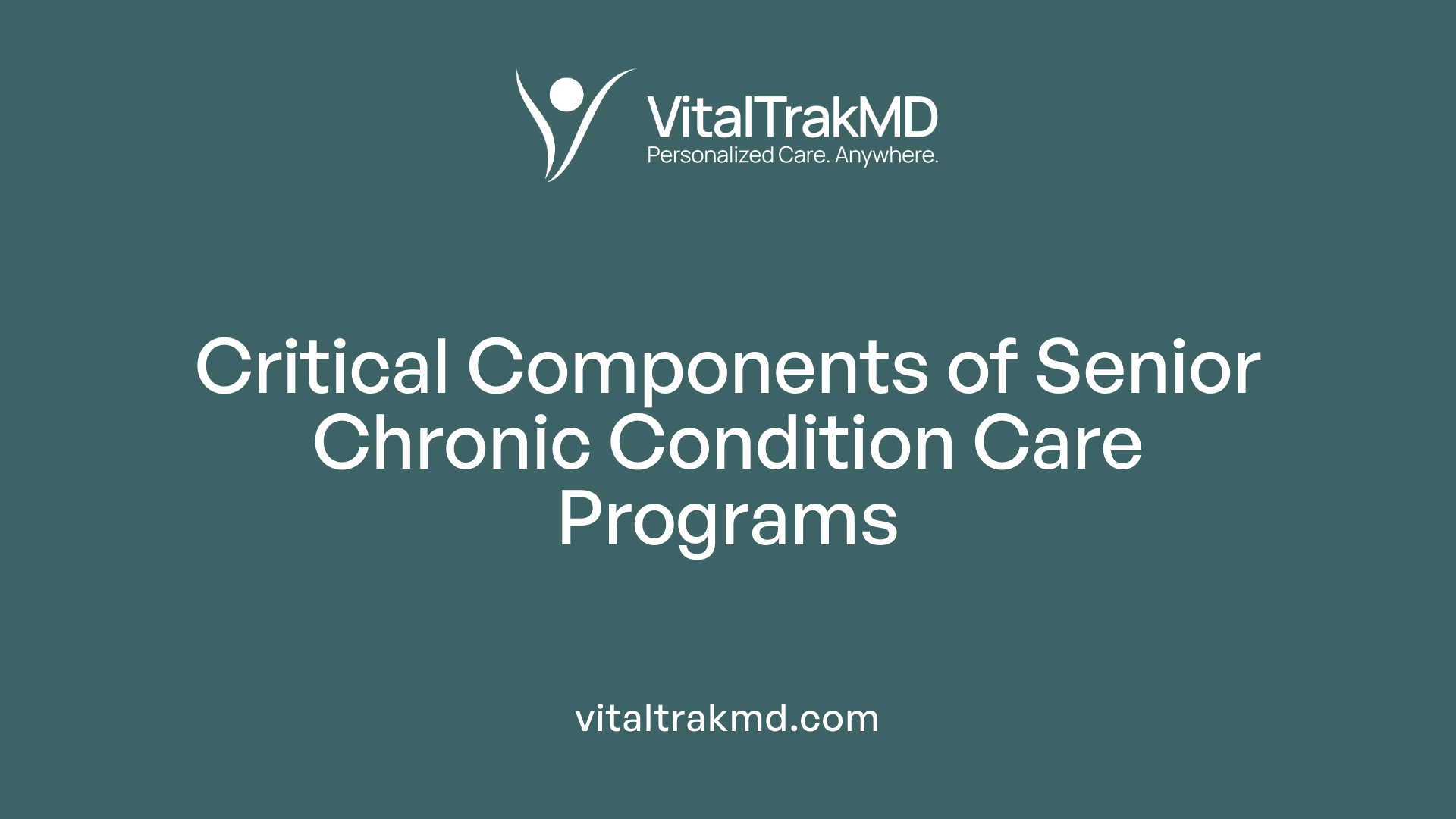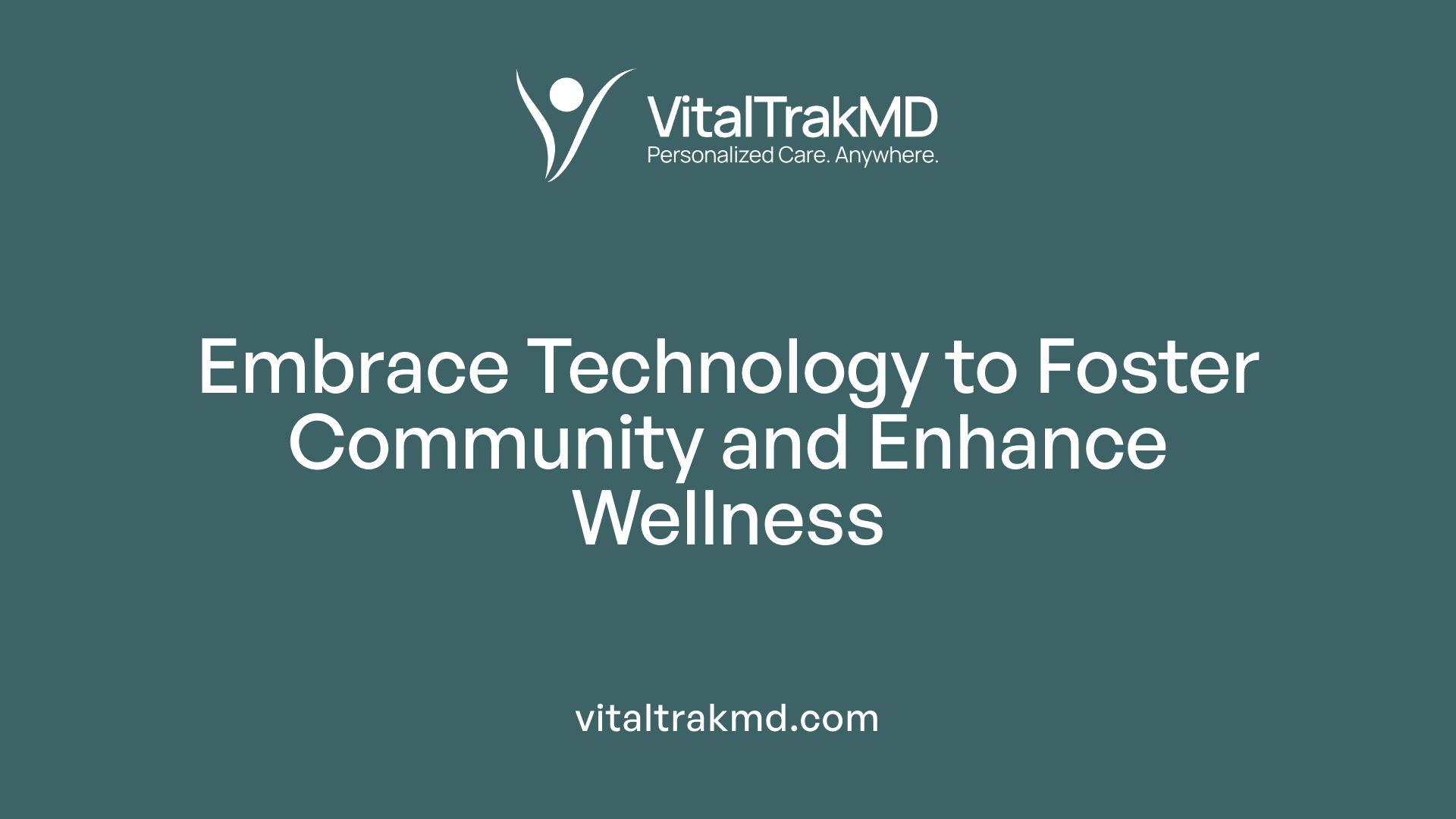Why Hybrid Programs Provide a More Holistic View of Senior Health

Understanding the Holistic Benefits of Hybrid Wellness Programs
In an aging society, addressing senior health requires more than isolated treatments. Hybrid wellness programs that combine in-person interaction with digital resources are emerging as an effective way to provide a comprehensive, personalized, and accessible approach to senior health. This model not only targets physical needs but also nurtures mental, emotional, and social well-being, providing a truly holistic view of senior health.
What Makes Wellness Programs Effective for Long-Term Senior Health?
What are the most effective wellness programs for achieving long-term health?
Wellness programs that achieve long-term health improvements in seniors are those that take a holistic approach. This means addressing nutrition, physical activity, stress management, and preventive care as interconnected elements of well-being. For example, programs like MyWay to Health offer individually tailored plans encompassing healthy eating, exercise, weight management, sleep, and stress reduction, supporting seniors' varied needs.
Combining onsite services with digital engagement is another powerful factor. Hybrid programs offer in-person health screenings, fitness classes, and workshops alongside digital tools such as wellness apps and telehealth services. This blended format increases accessibility and sustained engagement. Platforms like FitOn Health provide condition-specific exercise routines, nutritional guidance, and mindfulness content designed for older adults, helping to overcome barriers related to transportation or social isolation.
Program management plays a critical role in effectiveness. Ensuring confidentiality, voluntary participation, and adherence to legal requirements builds trust and promotes active involvement. Strong leadership and clear communication within organizations encourage ongoing participation and motivation among seniors.
To measure success, wellness programs employ evaluation metrics such as reductions in absenteeism, healthcare costs, and improvements in seniors’ physical and mental health. Tracking health outcomes allows programs to be refined continuously, maximizing their long-term impact on senior well-being.
Overall, effective wellness programs integrate holistic strategies tailored to seniors, embrace both technology and face-to-face engagement, operate under robust management principles, and focus strongly on measurable health improvements.
Tailoring Weight Loss Programs to Individual Senior Needs
How can weight loss programs be tailored to individual needs?
Weight loss programs designed for seniors require a holistic approach that moves beyond simple calorie counting. Comprehensive assessments should evaluate genetic, metabolic, psychosocial, environmental, and behavioral factors unique to each person. This ensures the interventions address root causes rather than symptoms alone.
Personalized nutrition therapy plays a crucial role. Diet plans can range from very low-calorie diets (VLCD) to low-calorie diets (LCD) and maintenance regimens, all adjusted to match an individual’s health status, protein needs, and personal preferences. This personalization supports effective hunger control and helps preserve muscle mass, which is vital for seniors.
Medical supervision must be aligned with the intensity of the weight loss strategy. For example, those on VLCD require closer monitoring, including regular blood tests and health assessments, to ensure safety and adapt the program as needed.
Behavioral therapies, such as cognitive-behavioral therapy, tackle psychological and environmental influences on weight. These therapies enhance long-term adherence by addressing habits, motivation, and potential emotional triggers.
Successful programs often involve multidisciplinary teams composed of physicians, dietitians, psychologists, and therapists. This collaborative environment provides continuous, individualized support that evolves with the senior’s changing health needs, fostering sustainable lifestyle changes and improved outcomes.
Mental Health's Role in Weight Loss and Wellness for Seniors

What role does mental health play in successful weight loss and wellness programs?
Mental health significantly influences the success of weight loss and wellness efforts, particularly among seniors. Motivation and adherence to program guidelines often depend on one’s psychological state. Research highlights that increasing depression, anxiety, or stress during these interventions can lead to reduced weight loss or even weight regain after six months.
How do depression, anxiety, and stress impact weight outcomes?
Depression, anxiety, and stress disrupt eating habits and physical activity levels, which are crucial for effective weight management. Seniors experiencing elevated psychological distress tend to struggle more with sustaining healthy behaviors, resulting in poorer outcomes. Additionally, negative mental health can lower energy levels and diminish the sense of control and confidence needed to persist through lifestyle changes.
What psychosocial interventions and support groups are beneficial?
Psychosocial support through counseling, support groups, and behavioral health coaching plays a pivotal role in improving weight loss success. Programs incorporating mental health services, like MyWay to Health and RealAge, offer tailored strategies addressing stress and motivation alongside physical health. Group settings further combat social isolation—a significant health determinant—by providing community and encouragement to maintain healthier habits.
How can seniors promote a positive mindset and psychological well-being in weight management?
Promoting mindfulness, optimism, and realistic goal-setting fosters a positive mindset, enhancing seniors’ resilience throughout their weight loss journey. Techniques such as meditation, yoga, and tai chi reduce stress and improve mood, supporting sustained lifestyle adherence. Emphasizing healthy, enjoyable eating rather than restrictive dieting helps reduce psychological distress and prevents depressive symptoms linked to harmful weight loss methods.
Integrating mental health support with nutritional and physical activity guidance creates a holistic approach that maximizes wellness and weight management success for seniors.
| Mental Health Factor | Impact on Weight Management | Support Strategies |
|---|---|---|
| Depression | Decreases motivation, increases weight regain risk | Counseling, support groups, mindfulness |
| Anxiety | Disrupts eating/sleep patterns, reduces physical activity | Behavioral coaching, stress reduction techniques |
| Stress | Lowers adherence to healthy habits | Yoga, meditation, psychosocial interventions |
| Social Isolation | Increases psychological distress | Group programs, social engagement |
This holistic integration ensures seniors receive comprehensive care addressing both mind and body, enhancing long-term wellness outcomes.
Key Elements of Effective Care Programs for Chronic Conditions in Seniors

What are the key components of effective care programs for chronic conditions?
Effective chronic care for seniors is holistic and patient-centered. It begins with collaborative care planning that includes the patient, their family, and the healthcare team. This approach ensures that all aspects of the senior’s unique needs and preferences are taken into account.
Remote patient monitoring plays a critical role by providing real-time health data. This enables early detection of changes, allowing timely intervention before complications arise. These technologies improve overall care quality and help prevent hospitalizations.
Care coordination is essential, particularly in managing multiple chronic conditions. Seamless communication among providers reduces duplicated tests, avoids conflicting treatments, and addresses social determinants of health – such as transportation, access to care, and social isolation – which strongly influence seniors’ health outcomes.
Patient education and self-management support empower seniors to take an active role in their health. Teaching skills such as medication management, symptom tracking, and healthy lifestyle habits helps boost confidence and effectiveness in managing chronic diseases.
Around-the-clock access to healthcare professionals and community resources ensures that seniors receive timely advice and support during emergencies or outside regular appointments.
Integrating evidence-based guidelines and clinical information systems into care programs improves consistency and efficiency. This proactive, organized approach reduces costs, enhances health outcomes, and improves quality of life for seniors living with chronic illness.
Addressing Social Determinants of Health Through Hybrid Wellness Programs

How Do Environment, Income, and Access to Care Influence Senior Health?
Social determinants of health (SDOH) such as income, neighborhood, and healthcare accessibility critically impact seniors' well-being. Limited income can restrict seniors' ability to afford nutritious food, medications, or fitness programs, while environmental factors like proximity to healthcare facilities or fitness centers affect their ability to maintain physical health. Transportation challenges and affordability issues often result in untreated chronic conditions, worsening health outcomes.
What Role Do Neighborhood and Social Relationships Play?
The neighborhood environment shapes seniors' ability to engage in physical activity and access health resources. Inadequate infrastructure or unsafe surroundings can discourage outdoor exercise. Additionally, social and community connections are vital; social isolation and discrimination increase the risk of mental health problems such as depression and heightened stress. Strong social ties enhance emotional resilience and encourage healthier lifestyle choices.
How Can Digital Platforms and In-Person Programs Overcome Barriers?
Hybrid wellness programs that blend digital engagement with face-to-face interaction effectively address these social determinants by improving accessibility and fostering community. Digital platforms like FitOn Health deliver tailored health education, fitness routines, nutritional guidance, and mindfulness content suitable for older adults regardless of location. In-person components build social connection and encourage accountability, helping seniors overcome physical and social barriers to health.
Why Integrate Wellness Into Medicare Advantage Plans?
Incorporating wellness initiatives into Medicare Advantage plans enables identification of individual social determinants affecting seniors’ health and delivers personalized support. This integration promotes holistic health management, addressing not only medical needs but also environmental and social factors, ultimately improving overall outcomes. Such coordinated approaches help reduce healthcare disparities and empower seniors to maintain a healthier, more engaged lifestyle.
Holistic Modalities Enhancing Senior Wellness in Hybrid Models

Benefits of Hydrotherapy, Massage, and Aromatherapy for Seniors
Holistic health approaches offer seniors a variety of therapeutic options that target the whole person. Hydrotherapy, such as warm baths, water-based exercises, and massages, is highly effective in reducing pain, stiffness, and enhancing circulation, making it an excellent choice for seniors experiencing arthritis and mobility challenges. Similarly, massage therapy helps alleviate muscle tension, improve blood flow, and maintain joint flexibility, contributing to overall physical comfort.
Aromatherapy utilizes essential oils like lavender, citrus, and peppermint to foster relaxation, elevate mood, and relieve headaches, providing a gentle yet impactful way to enhance emotional well-being among seniors.
Yoga, Tai Chi, and Meditation: Encouraging Flexibility, Balance, and Mindfulness
Gentle movement practices like yoga and tai chi are suitable for older adults, improving flexibility, balance, strength, and reducing stress. These activities also promote mindfulness, which benefits seniors by increasing body awareness and reducing anxiety.
Meditation complements these practices by further lowering anxiety levels, combating depression, improving sleep quality, and boosting cognitive functions—critical factors for healthy aging.
Creative Therapies: Art and Pet Therapy for Emotional Health
Creative and social therapeutic activities play an important role in mental and emotional wellness. Art therapy provides a pathway for seniors to express themselves creatively, reducing stress and improving mood and self-esteem.
Pet therapy, through interaction with animals, helps decrease stress and blood pressure, alleviates feelings of loneliness, and promotes joy, contributing positively to seniors’ mental health.
Nutritional Guidance and Weight Management Programs
A healthy diet rich in fruits, vegetables, whole grains, and lean proteins supports immune function, energy levels, and overall health. Holistic programs like Rezilient Weight Loss integrate GLP-1 medication with tailored nutrition and lifestyle changes to encourage sustainable weight management.
Programs such as MyWay to a Healthy Weight provide year-long behavioral support from dietitians, promoting healthy eating, physical activity, and stress management. Digital platforms supplement these efforts by offering personalized coaching, tracking, and educational content aligned with seniors' unique health needs.
Collectively, these holistic modalities, integrated within hybrid wellness programs that blend digital and in-person experiences, offer seniors effective and accessible ways to nurture their mind, body, and spirit, improving quality of life and long-term health outcomes.
How Technology Strengthens Senior Wellness and Community Connection

Digital Apps for Mindful Eating, Weight Loss, and Diabetes Prevention
Apps like Eat Right Now offer seniors evidence-based programs focused on mindful eating, weight loss, and diabetes prevention. These apps include coaching, tracking tools, and educational resources that help older adults form healthy habits while managing weight and chronic conditions efficiently.
Telehealth Access for Medical and Behavioral Health Needs
Telehealth platforms such as Teladoc provide seniors with 24/7 access to medical and behavioral health professionals. This service enables prompt management of nonemergency medical conditions, mental health support, and prescription needs without leaving home, overcoming common healthcare access barriers.
Fitness Memberships and Digital Workout Videos Tailored to Seniors
Programs like Active&Fit Direct offer affordable fitness memberships along with digital workout videos designed for older adults. These resources encourage safe physical activity, improve strength and flexibility, and promote overall well-being from the comfort of home or community centers.
Programs Fostering Social Connection and Reducing Isolation
Hybrid wellness programs combining digital and in-person engagement help reduce social isolation among seniors. Platforms like FitOn Health deliver condition-based education, fitness classes, and nutritional guidance, building community and emotional support networks crucial for mental health and wellness.
Technology empowers seniors by enhancing access to personalized health management tools and supportive communities, ultimately fostering holistic wellness and sustained engagement in healthy lifestyles.
The Future of Senior Health: Embracing Hybrid Holistic Care
Hybrid programs that merge the best of digital innovation and in-person interaction are proving essential in supporting seniors’ complex and varied health needs. Their ability to address physical, mental, social, and environmental aspects through personalized, accessible, and comprehensive care makes them the future of holistic senior health. By embracing these models, we can enhance wellness outcomes, sustain healthy weight management, and improve quality of life for our aging population.
References
- Discover the Nine Holistic Approaches to Senior Health
- Rezilient Health Weight Loss
- Addressing the Social Determinants of Health for Seniors
- MyWay to Health: Health Coaching, Weight Management ...
- Wellness Programs | UC - Health Net
- Designing and Managing Effective Wellness Programs
- Association of changes in mental health with weight loss ...
- The Psychological Side of Weight Loss
- Weight loss methods and risk of depression
- The relationship between psychological distress and weight ...
Recent articles
Want to Feel Better and Live Healthier?
Join hundreds of patients taking control of their health with personalized care that fits their life – not the other way around.
Rated 4.8/5 by 32+ customers







